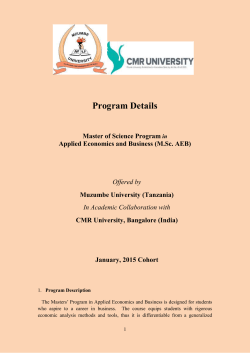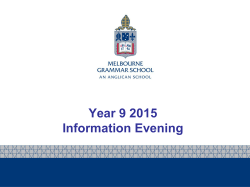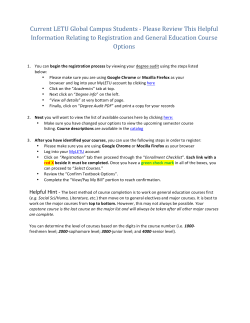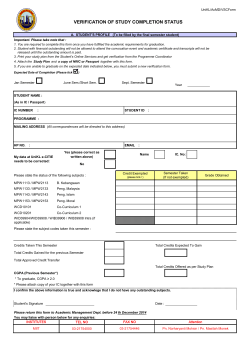
Students undertaking a major in Psychology or
Students undertaking a major in Psychology or enrolled in the Bachelor of Psychological Science, enrol in three first year courses, PSYC1001 Psychology 1A, PSYC1011 Psychology 1B and PSYC1111 Measuring Mind and Behaviour. Aside from these three core Psychology courses, you have the freedom to choose what other courses you take in your first year. Graduates from Psychology degrees find employment in a diverse range of workplace settings. Some examples include advertising, community development and relations, copyrighting, counselling, developmental care, public, community and occupational health, management consultancy, human resources, recruitment, training and development, industrial relations, market research, journalism, marketing, business and retail management, welfare and youth work, and many other areas. This is why having freedom of choice is beneficial for students of psychology. However, as a new student to the university, this freedom of choice can be overwhelming, so we have come up with a list of courses we think complement your psychology studies which may help you to choose courses. When choosing courses you also need to be aware of your program rules and requirements, ie Bachelor of Science students need to take 24UOC of ‘Science’ level 1 courses which means they will need to choose two additional courses to the core Psychology courses from the Faculty of Science in their first year. Please check your program rules in the Online Handbook when finalising your course selection, or check with staff in the relevant Student Centre. Psychology Courses Other first year courses offered by the School of Psychology are: • • • • PSYC1022 The Psychology of Addiction (Semesters 1 and 2) - This course deals with transdisciplinary issues pertinent to the understanding and treatment of drug addiction. PSYC1023 Abnormal Psychology (Semester 1) - This course will provide a contemporary view of issues associated with human mental disorders and psychopathology. PSYC1024 Clinical Perspectives on Mood, Anxiety and Stress (Semester 2) - The course will provide a comprehensive understanding of several of the most common mental disorders, including the mood and anxiety disorders, from a clinical psychology perspective. PSYC1031 Psychology of Resilience (Semester 2) - This course will introduce students to the theory, research and application of resilience and well-being from the perspective of psychological literacy. Science Courses The main complementary area to Psychology in Science is Neuroscience. Neuroscience is the study of the nervous system, and Neuroscience research spans from molecules, through cells and pathways, all the way up to complex human behaviour. Neuroscience integrates physics, chemistry, and biology, with studies of anatomy, physiology, and behaviour including human emotional and cognitive functions. There is a wide range of Science courses available. Below is a small selection. • • • • MATH1041 Statistics for Life and Social Sciences (Semester 1 or Semester 2) – This course is useful for students wanting to strengthen their understanding of statistics, an important part of studying psychology. It is assumed you have completed HSC Mathematics with a mark of at least 60 to undertake this course. BABS1201 Molecules, Cells and Genes (Semester 1) - This course is concerned with the basic characteristics of all life. It is useful for students interested in Neuroscience. BIOS1101 Evolutionary and Functional Biology (Semester 2) - The course examines the evolutionary history of life on earth from origins to humans and the relationship between environment, adaptation and function. It is useful for students interested in Neuroscience. CHEM1011 Chemistry A: Atoms, Molecules and Energy (Semester 1 or 2) - This course builds on an elementary knowledge of chemistry (equivalent to one year of high school chemistry) to explore the quantum mechanical structure of atoms leading to an understanding of the periodic trends in the properties of the elements. It is useful for students interested in Neuroscience. Human Resource Management or Management Management examines the processes, conceptual expertise and work functions involved in managing people and organisations effectively. Specialisation in human resource management provides a strong practical and theoretical grounding in the policies and processes involved in the management of people at work. The two courses below are useful for students interested in this area: • • MGMT1001 Managing Organisations and People (Semester 1 or 2) MGMT1002 Managing Organisational Behaviour (Semester 2 requires MGMT1001) Marketing Marketing is viewed as central to creating and delivering value both to the organisation and to the customer. It impacts all aspects of a business organisation, shaping and directing corporate through to marketing strategy. Many companies acknowledge that their growth and survival depends on putting the customer at the centre of their planning. The following course introduces students to the major concepts and theories, reflecting the breadth and diversity of marketing. • MARK1012 Marketing Fundamentals (Semester 1) Linguistics Linguistics is the study of human language. It seeks to address questions such as: How do people use language in various situations? What is the biological basis for language? Is language unique to the human species? How and why do languages change? How do children learn language? What is the meaning of ‘meaning’? Can machines talk? How does language relate to other modes of communication? The two courses below are useful to students interested in this area. • • ARTS1690 The Structure of Language (Semester 1) ARTS1691 The Use of Language (Semester 2) Criminology Criminology is an interdisciplinary field devoted to the study of crime, deviance, social control and the legal system. Contemporary criminological scholars investigate a broad range of topics including justice, conflict, risk, security, insurance, policing, governance and regulation. The two courses below are useful to students interested in this area, • • CRIM1010 Criminology: An introduction (Semester 1 or Semester 2) CRIM1011 Introduction to Criminal Justice (Semester 2) Philosophy Philosophy raises questions about all aspects of human life and the world and investigates them systematically. The study of Philosophy helps to develop students’ skills in critical thinking and analysis, effective communication and persuasion. The two courses below are useful to students interested in this area. • • ARTS1361 Introduction to Philosophy (Semester 1) ARTS1360 Introducing Moral, Social and Political Philosophy (Semester 2)
© Copyright 2025









